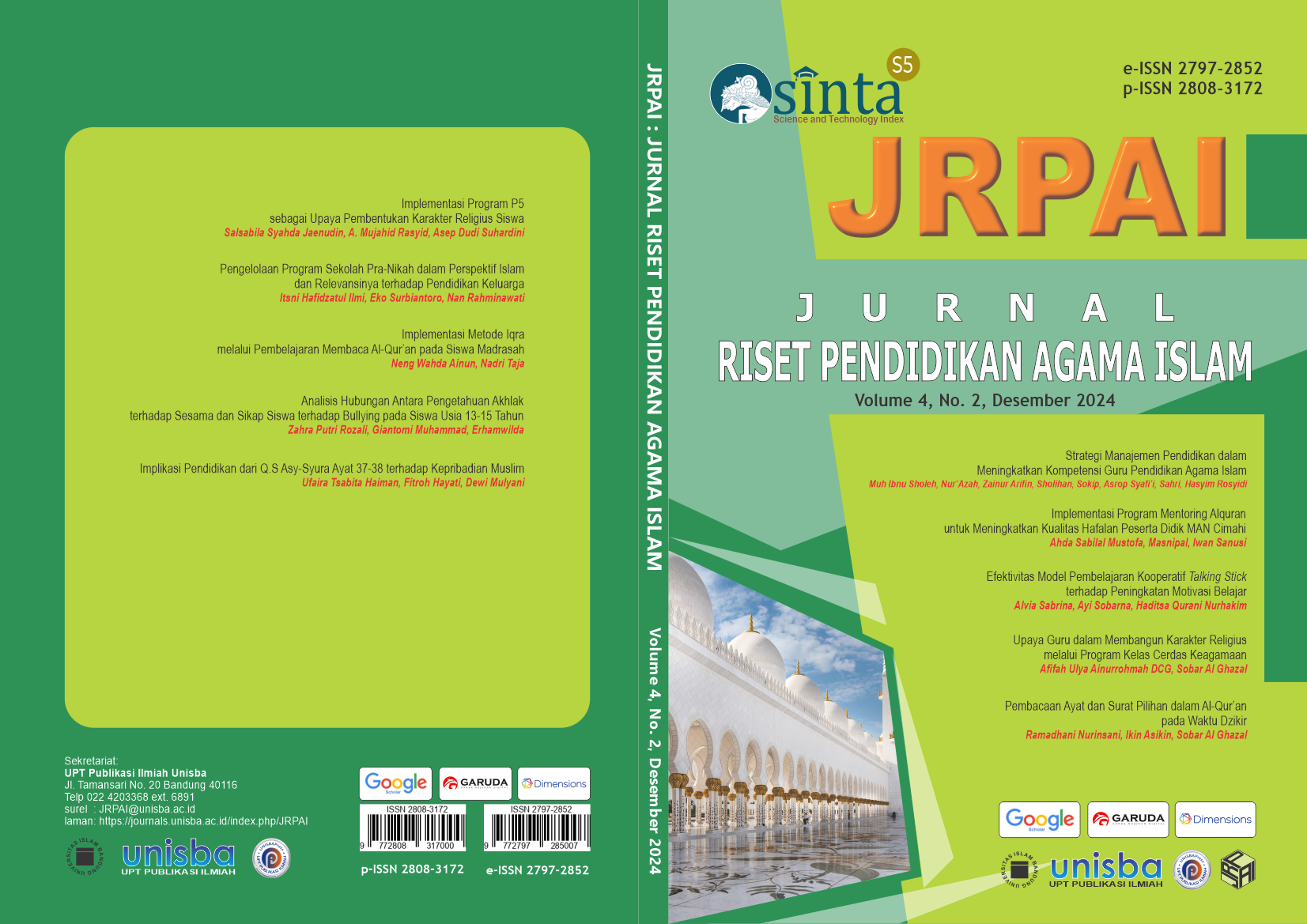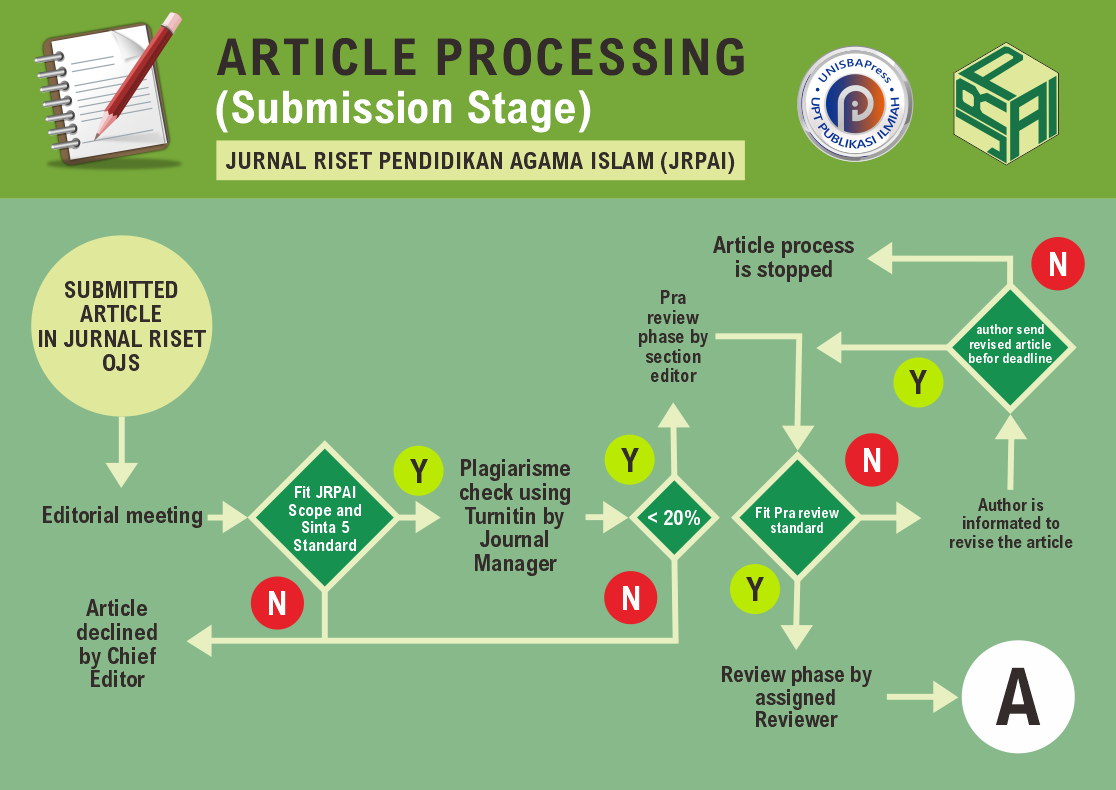Strategi Manajemen Pendidikan dalam Meningkatkan Kompetensi Guru Pendidikan Agama Islam
DOI:
https://doi.org/10.29313/jrpai.v4i2.4862Keywords:
Manajemen Pendidikan, Kompetensi Guru, Pengembangan KurikulumAbstract
Abstrak. Penelitian ini mengkaji strategi manajemen pendidikan di MTsN 1 Pasuruan yang bertujuan untuk meningkatkan kompetensi guru Pendidikan Agama Islam (PAI). Fokus utama penelitian meliputi pengembangan kurikulum merdeka berbasis komunitas, penggunaan teknologi dalam pembelajaran, pendekatan kolaboratif antar guru, serta evaluasi berkala dan umpan balik. Metode penelitian yang digunakan adalah kualitatif, dengan subjek penelitian adalah guru PAI. Data dikumpulkan melalui wawancara mendalam, observasi, dan dokumentasi. Analisis data dilakukan dengan mengumpulkan, mereduksi, menyajikan data, dan menarik kesimpulan. Temuan penelitian menunjukkan bahwa pengembangan kurikulum merdeka berbasis komunitas efektif dalam memastikan materi ajar relevan dengan kebutuhan siswa dan perkembangan zaman. Penggunaan teknologi mempermudah penyajian materi dengan cara yang menarik dan interaktif, serta meningkatkan keterlibatan siswa. Pendekatan kolaboratif antar guru membantu dalam mengembangkan metode pengajaran yang lebih baik dan memperkuat hubungan kerja yang harmonis. Evaluasi berkala dan umpan balik yang konstruktif memungkinkan perbaikan kelemahan serta perencanaan pelatihan yang sesuai. Secara keseluruhan strategi manajemen pendidikan di MTsN 1 Pasuruan terbukti efektif dalam meningkatkan kualitas pengajaran dan kompetensi guru, serta menciptakan lingkungan belajar yang dinamis dan responsif terhadap kebutuhan siswa.
Abstract. This research examines the education management strategy at MTsN 1 Pasuruan which aims to improve the competency of Islamic Religious Education (PAI) teachers. The main focus of the research includes the development of a community-based independent curriculum, the use of technology in learning, a collaborative approach between teachers, as well as regular evaluation and feedback. The research method used is qualitative, with the research subjects being PAI teachers. Data was collected through in-depth interviews, observation and documentation. Data analysis is carried out by collecting, reducing, presenting data and drawing conclusions. Research findings show that community-based independent curriculum development is effective in ensuring teaching materials are relevant to student needs and current developments. The use of technology makes it easier to present material in an interesting and interactive way, and increases student engagement. A collaborative approach between teachers helps in developing better teaching methods and strengthens harmonious working relationships. Regular evaluation and constructive feedback allow for improvement of weaknesses as well as planning appropriate training. Overall, the education management strategy at MTsN 1 Pasuruan has proven to be effective in improving the quality of teaching and teacher competency, as well as creating a learning environment that is dynamic and responsive to student needs.
References
Anderson, L. W., & Krathwohl, D. R. (2001). A taxonomy for learning, teaching, and assessing: A revision of Bloom’s taxonomy of educational objectives. Longman.
‘Azah, N., Sholeh, M. I., Aziz, A. A., Al-Fatih, M., Pratiwi, E. Y. R., & Masruroh, L. (2024). Implementation of the Pancasila Student Profile Strengthening Project for Preserving Local Traditions at MTsN 17 Jombang. Jurnal Pendidikan Dan Pembelajaran Indonesia (JPPI), 4(3), 1069–1082. https://doi.org/10.53299/jppi.v4i3.700
Black, P., & Wiliam, D. (1998). Assessment and Classroom Learning. Assessment in Education: Principles, Policy & Practice, 5(1), 7–74. https://doi.org/10.1080/0969595980050102
Black, P., & Wiliam, D. (2010). Inside the Black Box: Raising Standards through Classroom Assessment. Phi Delta Kappan, 92(1), 81–90. https://doi.org/10.1177/003172171009200119
Brownell, M. T., Adams, A., Sindelar, P., Waldron, N., & Vanhover, S. (2006). Learning from Collaboration: The Role of Teacher Qualities. Exceptional Children, 72(2), 169–185. https://doi.org/10.1177/001440290607200203
Butler, J. I. (2006). Curriculum constructions of ability: enhancing learning through Teaching Games for Understanding (TGfU) as a curriculum model. Sport, Education and Society, 11(3), 243–258. https://doi.org/10.1080/13573320600813408
Cao, W. (2023). A meta-analysis of effects of blended learning on performance, attitude, achievement, and engagement across different countries. Frontiers in Psychology, 14. https://doi.org/10.3389/fpsyg.2023.1212056
Creswell, J. W. (2009). Research design: Qualitative, quantitative, and mixed methods approaches (3rd ed.). Sage Publication.
Darling-Hammond, L. (2000). Teacher Quality and Student Achievement. Education Policy Analysis Archives, 8, 1. https://doi.org/10.14507/epaa.v8n1.2000
Darling-Hammond, L. (2009). Research Review / Teacher Learning: What Matters? Education Leadership. https://doi.org/10.14507/epaa.v8n1.2000
Delgado, A., Wardlow, L., O’Malley, K., & McKnight, K. (2015). Educational Technology: A Review of the Integration, Resources, and Effectiveness of Technology in K-12 Classrooms. Journal of Information Technology Education: Research, 14, 397–416. https://doi.org/10.28945/2298
Glesne, C. (2016). Becoming qualitative researchers: An introduction. Pearson.
Guskey, T. R. (2002). Professional Development and Teacher Change. Teachers and Teaching, 8(3), 381–391. https://doi.org/10.1080/135406002100000512
Hargreaves, A. (2001). Changing teachers, changing times. Teachers College Press.
Hattie, J. (2009). Visible Learning: A Synthesis of Over 800 Meta-Analyses Relating to Achievement. Taylor & Francis Group.
Hattie, J., & Timperley, H. (2007). The Power of Feedback. Review of Educational Research, 77(1), 81–112. https://doi.org/10.3102/003465430298487
Johnson, D. W., & Johnson, R. T. (2009). An Educational Psychology Success Story: Social Interdependence Theory and Cooperative Learning. Educational Researcher, 38(5), 365–379. https://doi.org/10.3102/0013189X09339057
Johnstone, S. M., & Soares, L. (2014). Principles for Developing Competency-Based Education Programs. Change: The Magazine of Higher Learning, 46(2), 12–19. https://doi.org/10.1080/00091383.2014.896705
Mertens, D. M. (2023). Research and evaluation in education and psychology: Integrating diversity with quantitative, qualitative, and mixed methods. Sage publications.
Meyer, D. K. (2009). Entering the Emotional Practices of Teaching. In Advances in Teacher Emotion Research (pp. 73–91). Springer US. https://doi.org/10.1007/978-1-4419-0564-2_5
Miles, M. B., Huberman, A. M., & Saldana, J. (2014). Qualitative data analysis: A methods sourcebook. SAGE Publications.
Minarti, S., Ma’arif, M. J., Manshur, A., ‘Azah, N., Sholeh, M. I., & Sahri, S. (2024). The Influence Of Teacher Training And The Use Of Educational Technology On The Effectiveness Of Islamic Education Learning At Man 1 Bojonegoro. Educational Administration: Theory and Practice. https://doi.org/10.53555/kuey.v30i4.1404
Muchira, J. M., Morris, R. J., Wawire, B. A., & Oh, C. (2023). Implementing Competency Based Curriculum (CBC) in Kenya: Challenges and Lessons from South Korea and USA. Journal of Education and Learning, 12(3), 62. https://doi.org/10.5539/jel.v12n3p62
Patton, M. Q. (2002). Qualitative Research & Evaluation Methods. Sage Publications.
Schindler, L. A., Burkholder, G. J., Morad, O. A., & Marsh, C. (2017). Computer-based technology and student engagement: a critical review of the literature. International Journal of Educational Technology in Higher Education, 14(1), 25. https://doi.org/10.1186/s41239-017-0063-0
Sholeh, M. I. (2023). Strategi Manajemen Organisasi Pendidikan Islam dalam Menghadapi Tantangan Global. Edu Journal Innovation in Learning and Education, 1(1), 1–27. https://doi.org/10.55352/edu.v1i1.456
Sholeh, M. I., Al fatih, M., Syafii, A., Muzakki, H., Wahrudin, B., Syafiuddin Shobirin, M., Rosikh, F., fathurr, M., & Kh Muhammad Ali Shodiq Tulungagung, S. (2024). Implementation Of Kh Hasyim ’Asyari Educational Principles In Madrasah Reality. Theory and Practice, 2024(4), 503–515. https://doi.org/10.53555/kuey.v30i4.1495
Sholeh, M. I. (2024). Pengaruh Kinerja Guru dan Pengembangan Kurikulum Terhadap Prestasi Belajar Siswa di SDI Al-Badar Tulungagung. In Jurnal Karya Ilmiah Pendidik dan Praktisi SD&MI (JKIPP) (Vol. 3, Issue 1). https://e-journal.iainptk.ac.id/index.php/jkipp
Sholeh, M. I., Nasihudin, M., Ahmad, Z., & Azizah, M. (2024). Mengoptimalkan Penggunaan Teknologi Untuk Pemasaran Aksesoris Hp Anggota Onc Melalui Platform Digital.
Sholeh, M. I., Ramadhan Abd Allah Mohamed, M., Ali, H., Syafi, A., Kh Muhammad Ali Shodiq Tulungagung, S., & Ali Rahmatullah Tulungagung, S. (2024). Enhancing English Proficiency at Ngubalan Elementary School in Tulungagung: An Integrated Approach. In International Journal of Language, Humanities, and Education (Vol. 7, Issue 1).
Vescio, V., Ross, D., & Adams, A. (2008). A review of research on the impact of professional learning communities on teaching practice and student learning. Teaching and Teacher Education, 24(1), 80–91. https://doi.org/10.1016/j.tate.2007.01.004
Yin, R. K. (2009). Case study research: Design and methods (Vol. 5). SAGE Publications.
Yoon, K. S. (2007). Reviewing the evidence on how teacher professional development affects student achievement. Regional Educational Laboratory Southwest (NJ1).














